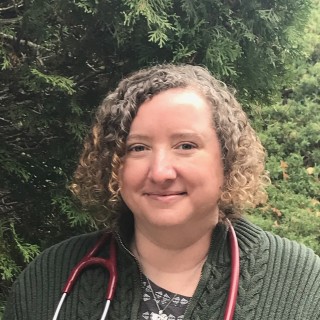
Secondary trauma is the official term for the trauma healthcare workers experience caring for patients facing traumas or deaths. Every physician has their stories. We have all heard the wail of grieving mother. It is a sound that haunts. We have seen families shattered in an instant. We have held hands as people died. We have seen suffering. Often our grief is complicated by guilt. Guilt that perhaps we could have done more to prevent the death. These traumas accumulate over years and lead to burnout, emotional numbing, and in some unhealthy coping behaviors such as drinking. Some seek counselors or ministers. Some confide in spouses. In my experience when healthcare providers gather we share some of the unusual encounters we have had — the objects recovered from noses or rectums or the outlandish tales from clinic. But I have found people keep the traumas to themselves. We all suffer in silence. Twitter has now brought a new forum for airing these traumas. A virtual water-cooler.
The hashtag #thosewecarry and #shareastoryinonetweet took off on medical Twitter this spring. #thosewecarry was more specifically focused on deaths/traumas. #shareastoryinonetweet eliciited not only tales of deathes/traumas but stories showing the humanity of both patients and providers alike. This movement has its detractors in part as many of the stories are unique enough as to be identifiable.
#thosewecarry was launched first. It is a twitter account with the name “The Haunted One” that re-tweets anonymous tweets and to which followers can tag @thosewecarry. The pinned tweet lists the rules: “1: This is a safe place, but public. Nothing easily identifiable, please. 2: Be aware that these stories carry significant emotional memories. They’re hard to read, and they were hard to write. Be kind. 3: No abuse, no bickering.”
Here are some tweets posted to #thosewecarry:
The heaviest door I have ever pushed open is the one I open, and hold open, for the family and friends as we walk toward my patient’s room to have them say their final goodbyes. No amount of training, preparation, simulation, or humanity can help you in that moment. @thosewecarry
— Sumit Patel (@S_P_MD) April 13, 2018
7 years ago today I attempted to take my life and ended up in ICU, comatose with a GCS of 3. I worked hard and got well with a lot of support from great nurses, doctors and allied health practitioners. Now I'm on clinical placement training to be a nurse. #ShareAStoryInOneTweet
— Ella (@coffeebean) <a href="https://twitter.com/coffeebean/status/995485239664242688?ref_src=twsrc%5Etfw">May 13, 2018
You awoke in ICU with no memory of the accident. I was on call, 27 years old.
— David Juurlink (@DavidJuurlink) May 7, 2018
I had to tell you your wife didn’t make it. And then, I told you your legs were gone too.#ShareAStoryinOneTweet
Got paged “3yM, GSW to head, CPR in progress, ETA 5m”. Ran to ER.
— Jon Hagedorn, MD (@jonhagedornmd) May 6, 2018
I intubated you. I pushed on your chest. And I was there when you died.
Your tiny body reminded me of my son’s. I cried afterwards for you and your family. I’ll never forget your name. #ShareAStoryInOneTweet
As Brian Fishman says, these stories are hard to read.
Is there a way to mute hashtags? Because holy shit, even for a medical professional, #ShareAStoryinOneTweet is fucking ROUGH.
— Brian Fishman, DO MS (@BrianFishmanDO) May 6, 2018
Even reading them over can contribute to trauma. Does feeling part of the community and knowing others share similar experiences benefit more than the harm of reading a litany of sad stories ?
Others took to this hashtag to tweet stories of survivorship and hope.
Cardiac arrest, resuscitative thoracotomy, and everyone told me statistics say you won’t live. I told your daughters “statistics say you won’t survive” __ I was young and naive_full of “hope” + we did our best and you are #LivingProof _ #ShareAStoryInOneTweet pic.twitter.com/5f7vyAUTWJ
— Lillian Liao (@liaoroussos) May 6, 2018
You were 5 and had appendicitis. You were scared about having surgery. You told me you would only have an operation if I made Teddy better too. I promised I would. Teddy came to the operating theatre with you. I kept my promise.#TellAStoryInOneTweet pic.twitter.com/2puX8pm95k
— John-Joe Reilly (@jayjayaah) May 12, 2018
You were worried because of abdominal pain. Your husband feared the worst.
— L B C ² (@lbcsquared2) May 6, 2018
You had 7 miscarriages previously.
The entire ER heard you and your husband shriek and then cry tears of joy when you heard that you were 12 weeks pregnant with twins.
we cried too__#ShareAStoryInOneTweet
You came for a 16 year checkup. Pos depression screen. Unsecured firearm at home. Convinced your folks to get it out of the house. Set up counseling. You called to thank me the next week, said you planned to end your life that night. You're in college now. #ShareAStoryInOneTweet
— Deborah Greenhouse (@greenhousemd) May 6, 2018
You were hit by a car right in front of me while walking your dog
— Brave Enough MD (@RUBraveEnough) May 5, 2018
I ran to you, did CPR, didn’t think you’d live
I was burned out, empty, ready to quit med
6 mo later, you called me on Christmas Eve & told me I saved you
And you ended up saving me.
#ShareAStoryInOneTweet
Others found solace in the tweets.
In reading #ShareAStoryInOneTweet I feel eerily ‘there’ with so many stories,as though looking over the storyteller’s shoulder.Testament to what we carry and how we care when we can not necessarily heal.
— Dr Lisa Habermehl (@NWOdoctor) May 6, 2018
These #ShareAStoryInOneTweet stories from medical professionals tonight are so bloody moving and humbling and inspiring and depressing.
— Angela Mulholland (@AngeMulholland) May 6, 2018
One tweeter, Natalie Martinek took to twitter to criticize the airing of stories.
This is my commentary on #twitter #movements. Before I go I want to preface this with a statement: I love humans. We're amazing creative & powerful beings. I'm fascinated by human behaviour and the hidden motivations underlying our basic need to belong. 1/
— Nathalie Martinek PhD (@NatsforDocs) May 8, 2018
I've observed some movements taking off on Twitter. Some for #MedEd, raising awareness, knowledge sharing, inspiration and sharing failings, wounds & triumphs. Generally they support creative expression in 280 characters. Awesome! 2/
— Nathalie Martinek PhD (@NatsforDocs) May 8, 2018
As these movements gain momentum, more people want to join in b/c #belonging. I'm seeing a disturbing trend of sharing experiences of patients/clients to promote how deep & human they are. Some are purely intended, some not. 3/
— Nathalie Martinek PhD (@NatsforDocs) May 8, 2018
Where's the line between sharing testimonials for self-promotion & desire to contribute meaningfully to a conversation that doesn't compromise confidentiality & personal ethics? Wait, there's more. 4/
— Nathalie Martinek PhD (@NatsforDocs) May 8, 2018
Here's the thing. One of the biggest businesses in medicine currently is #burnout prevention. Everyone's fed up: it's harming healthcare professionals, patients & destroying the system (good for forced innovation... oops sidetracked). Burnout causes are multifactorial. 5/
— Nathalie Martinek PhD (@NatsforDocs) May 8, 2018
Some are external factors like abusive, exclusive & conformity-driven workforce cultures that leave little room for professional creativity, self-expression & performing the duties they actually signed up for before at least a decade of intense education & training. 6/
— Nathalie Martinek PhD (@NatsforDocs) May 8, 2018
There are internal factors, such as feeling in control of your life, sense of personal & professional satisfaction. Literature says a lot about emotional exhaustion. I disagree. This falls into the causes of empathic drain/compassion fatigue. That's a thread for another day. 7/
— Nathalie Martinek PhD (@NatsforDocs) May 8, 2018
One of the biggest drains of energy that contribute to burnout is not a shitty workplace, lack of self-care, busyness, interpersonal conflict or anything anyone is talking about. Are you still with me?
— Nathalie Martinek PhD (@NatsforDocs) May 8, 2018
I'm talking about needing APPROVAL. 8/
Like belonging, approval is a basic human need. If you think about how we're raised, educated & promoted along a career path, it's mainly based on proving one's value based on a set of expectations, KPIs, GPA scores and so on. 9/
— Nathalie Martinek PhD (@NatsforDocs) May 8, 2018
Others like Shannon McNamara acknowledge the grief we all carry and urges a more systematic and institutional way to deal with them.
The well of secondary trauma is DEEP in medicine. @thosewecarry is real. Take any doc or nurse out for drinks & ask them what it's like to watch someone die. We all have stories. I haven't seen a successfully operational model to address that trauma on an institutional level.
— Shannon McNamara, MD (@ShannonOMac) June 2, 2018
These stories are at the same time beautiful and difficult to read. There is certainly a warm feeling to know that you are not the only one carrying these burdens. I wonder if most healthcare provider suffer from PTSD from some of the experiences we have lived through. The common elements of loss, and grief, and hope in these stories foster a kinship. But the criticisms of breaking confidentiality are valid. Sharing these stories should be for healing and not for one-upmanship. Perhaps as providers we can create safe spaces within our community that are healing, protect confidentiality, and are safe. Some institutions have debriefings after deaths or trauma incidents. Perhaps just as time-outs before surgery became standard of care in a few years, a debriefing should be standard of care after a trauma or death.






